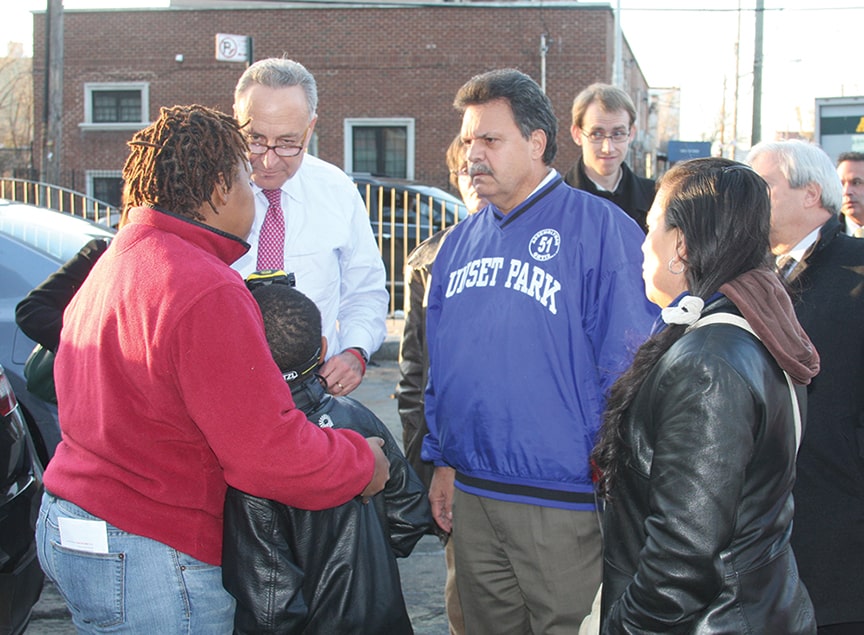Felix Ortiz has represented Red Hook and Sunset Park in the NY State Assembly for over 20 years. Last year, following the removal of Sheldon Silver as Assembly Speaker, Ortiz became the Assistant Speaker for the new Assembly leader Carl Heastie.
We have gotten to know Felix well over the past five years publishing the Star-Revue, as well as his Community Liaison Karen Broughton. Both are familiar faces in Red Hook.
We dropped in on Felix right before Christmas to find out more about the duties of a NY State Assemblyman. His Sunset Park office was filled with both Christmas cheer and constituents needing help.

Star-Revue (SR): We are curious to find out about your new duties as Assistant Speaker as well as what exactly an Assembly member does.
Felix Ortiz (FO): The State Assembly is composed of 150 members while the State Senate has 63. Our main purpose is to allocate resources, which entails creating a budget to present to the governor. The biggest power of the legislature is the outcome of that budget, and how we do the negotiations to make sure we protect our constituents – ensuring that needed services will continue. If, for one reason or another, we have to make cuts to make the budget balance, the Assembly and the Senate have to come together with the governor and agree about what services can be cut, and by how much.
We are constantly looking at how money comes in to the state, and compare it to the projections, making sure we are on track. Starting every September, the Senate and Assembly get together to analyze the numbers. By December we have a good idea of how much money we will have to work with as we negotiate the next budget.
The fiscal year begins in July and the budget has to be ready by April 1.
Right now, things are going well with revenues, and we have an indication that we will have a surplus of between one and one and a half billion dollars.
(SR): What kinds of programs are funded by the state?
(FO): Among the things we fund are education, health care, corrections, law enforcement around the state, and programs for people with disabilities and mental health programs.
(SR): What about lawmaking?
(FO): The State has sovereignty over local municipalities. Municipalities make local ordinances regulating their own local area. We are always looking at the local laws. Occasionally we will feel that a local law is a great idea, and then we will try to take that idea and make it a statewide law. In other words, we unify the ordinance.
A good example are the laws regulating driving and cellphones. I was already thinking about the dangers of driving and talking back in 1996. Others were saying that legislating against it was a ridiculous idea. But by 1998, both Suffolk and Nassau counties enacted their own ordinances. The ordinances were different. One said that if you got caught talking on the cellphone, they would give you a $50 summons. The other jurisdiction, right next to the first one, imposed a $100 fine. Next, Albany came in with $200, and Saratoga with $50.
We needed to unify that law, because so many drive between one county and another without even realizing it. If you are crossing from Westchester to the Bronx, for example, or Suffolk and Nassau, you can fight the ticket, because it is not a state mandate. So I introduced my own bill, making it a $100 fine statewide, and allowing the use of a hands-free device.
That is one way how the state and cities work together.
(SR): Do you ever invalidate a local law?
(FO): Now we are talking about Home Rule. A home ruling is a resolution that has comes from the City Council and the Mayor, and is then sent to the state legislature. We will look at it and make a decision as to whether it is doable for the city. One example is a municipality asking for a 1, 2 or 3 percent tax break, or perhaps a tax increase for hotels.
Sometimes we will have to strengthen a local law. You might remember a few years ago when there was a scaffolding in Manhattan that collapsed. The city’s Building
Department told us that local regulations were strong and they did not need the state to examine them. But we held public hearings and found a lot of deficiencies in the city regulations, so we strengthened those regulations, and made them state law.
When Bloomberg was mayor, I was working on a bill to require fast food restaurants to publish calorie counts. I introduced that bill back in 1998.
In the late 1980’s, the State of NY gave the NYC Department of Health the power of self-regulation, but with state oversight.
Bloomberg knew that my bill was an uphill battle, so he told his commissioner to hold public meetings leading to the creation of a city labeling law. I testified at the public hearing and the City Council passed the regulation.
Another county did the same thing. However, one law called for the labeling of calories and trans fat, the other for sodium. In order to unify the law, I brought my original bill back to the Assembly and boom – it passed both houses and became a unified statewide calorie labeling law – the first one in the country.

(SR): What is it like dealing with lobbyists?
(FO): That’s a very interesting question because you are facing a highly powerful group. When my calorie bill came to the floor, three different lobbyists, hired for $4 million by the fast food industry, were able to get the bill pulled at the last minute. At that point they won. Afterwards, company executives came to me to ask how we could make the bill better for them.
We ended up passing the original bill. I don’t know why they spent that money to defeat me, and then walked away. But I won – I won that battle.
(SR): How did the lobbyists get the bill pulled?
(FO): They were able to get the ears of the leadership, who pulled the bill from the calendar.
The same thing happened with the cellphone bill. There was a lot of opposition from the wireless industry. I was able to persevere, hold roundtable discussions, and get it passed.
Lobbyists are very powerful. When you go against them you can end up being crucified. But people know me, I never give up – they know I am persistent, I don’t lie down like a little mosquito. Once I take on an issue, I take it to the finish line. That’s the great thing about being in Albany. Whatever I take on, I get it done and people know that. And that’s the reason they respect me so much.
(SR): I understand that a lot of what you do is on a statewide basis. But what is expected of you in the district. When people come to your office, what are they asking, and what can you do for them?
(FO): Well, lets look at two things right now. You have programs in my district for prevention of alcohol and drug abuse. You have programs for HIV. We control funding and regulation for those programs. You want to make sure that the programs are effective and have addressed the needs of my community. If there are grants available I will inform them and encourage them to apply.
(SR): Do you have discretionary funds to use for the district as does the City Council?
(FO): (We do have discretionary funds available, but it’s minimal. Our advantage is that when you are working with a $172 billion budget and there are programs that are popular and needed I can help them secure state funding.
We also maintain relations with local officials and city agencies, so that when someone with a problem comes to our office, we can help them, either by something my office can do, or by referring them to the proper place. Someone in need may not know the difference between city and state government, they just need help.
Maybe there is too much garbage in the street, maybe there’s a pothole. They come in with housing problems. I’m not going to tell my staff they can’t take care of these people.
We have to take care of whoever walks in the door. We are here to solve their need. Everybody in my office gets trained as to the makeup of city agencies, what the state can do, and even what the US Congress can do locally.
For example, we get many people here on immigration issues. We have given citizenship tests in my office for the past twenty years. We have helped many become citizens. That’s not our job per se – but that’s our responsibility as elected officials – to do whatever we need to do to represent our people well.
(SR): Finally, what does it mean to be Assistant Speaker?
(FO): It is a great honor to be in this position. I continue to work, and work even closer, with the budget. I am on the Ways and Means committee which evaluates the budget. It gives me the opportunity to continue to work with the other members, in particular new members. I orient them with information about how the Assembly works – how to put together a bill, how to make sure their community is being taken care of, how they can look into the budget, into the State agencies, to discover grant opportunities for their district, and who to contact in local and state agencies in order to find a solution to problems in their district.








